University of Sunshine Coast: Mental Health Nursing & Depression
VerifiedAdded on 2023/01/04
|6
|1561
|219
Essay
AI Summary
This assignment examines the essential role of mental health nurses in establishing therapeutic relationships with patients experiencing depression. It delves into the core components of a therapeutic alliance, emphasizing the importance of communication, empathy, and trust. The essay highlights strategies such as initiating therapeutic communication, promoting lived experiences, demonstrating positive behavior, and utilizing appropriate body language to foster a supportive environment. It underscores the significance of mutual collaboration and goal-directed relationships in empowering consumers and facilitating their recovery. The assignment references key literature to support its arguments, providing a comprehensive overview of the complexities involved in providing effective mental health care. The essay also addresses the challenges nurses face, such as patient reluctance and concerns about causing emotional distress, while emphasizing the long-term benefits of building a strong therapeutic relationship for improved patient outcomes.
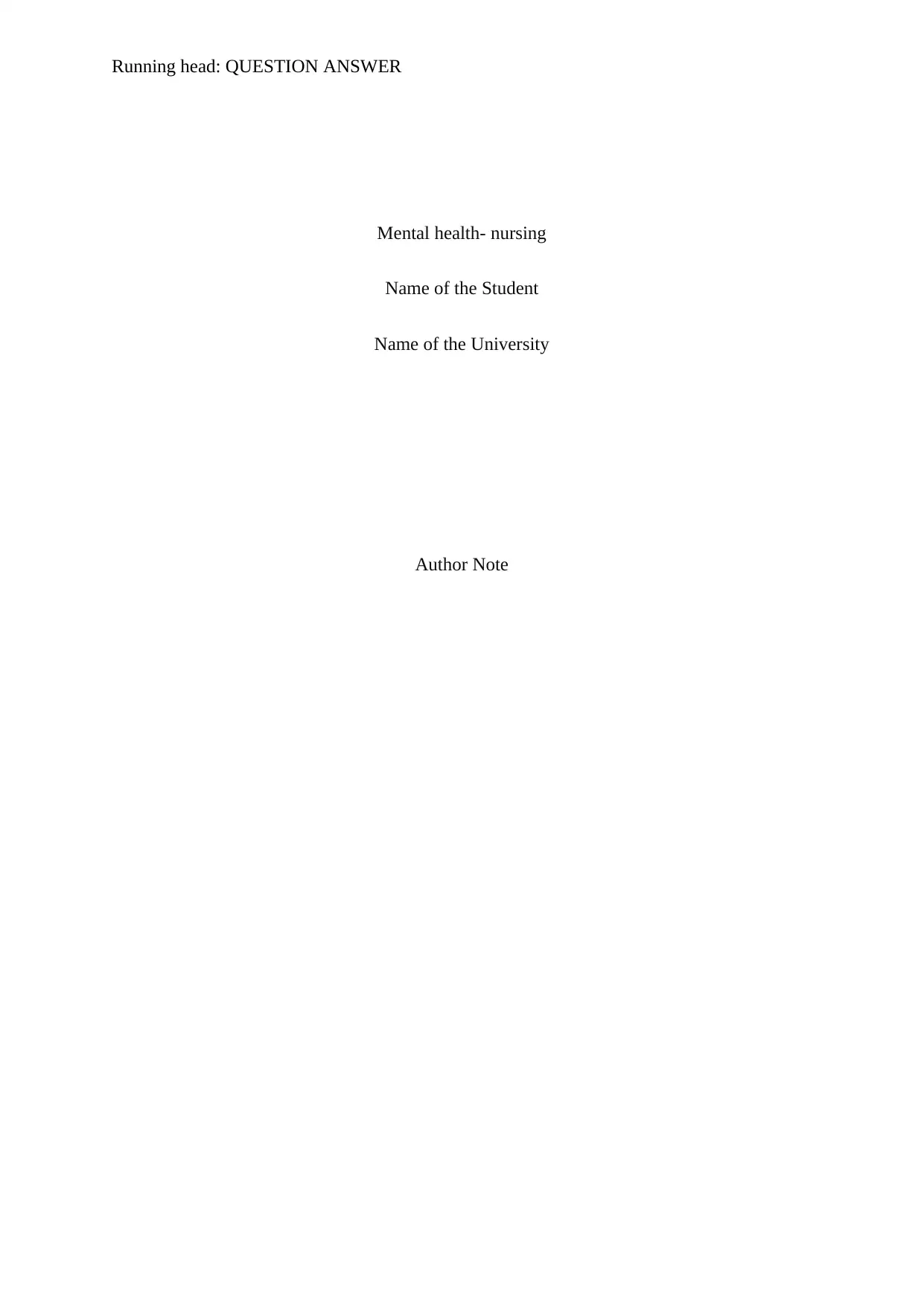
Running head: QUESTION ANSWER
Mental health- nursing
Name of the Student
Name of the University
Author Note
Mental health- nursing
Name of the Student
Name of the University
Author Note
Paraphrase This Document
Need a fresh take? Get an instant paraphrase of this document with our AI Paraphraser
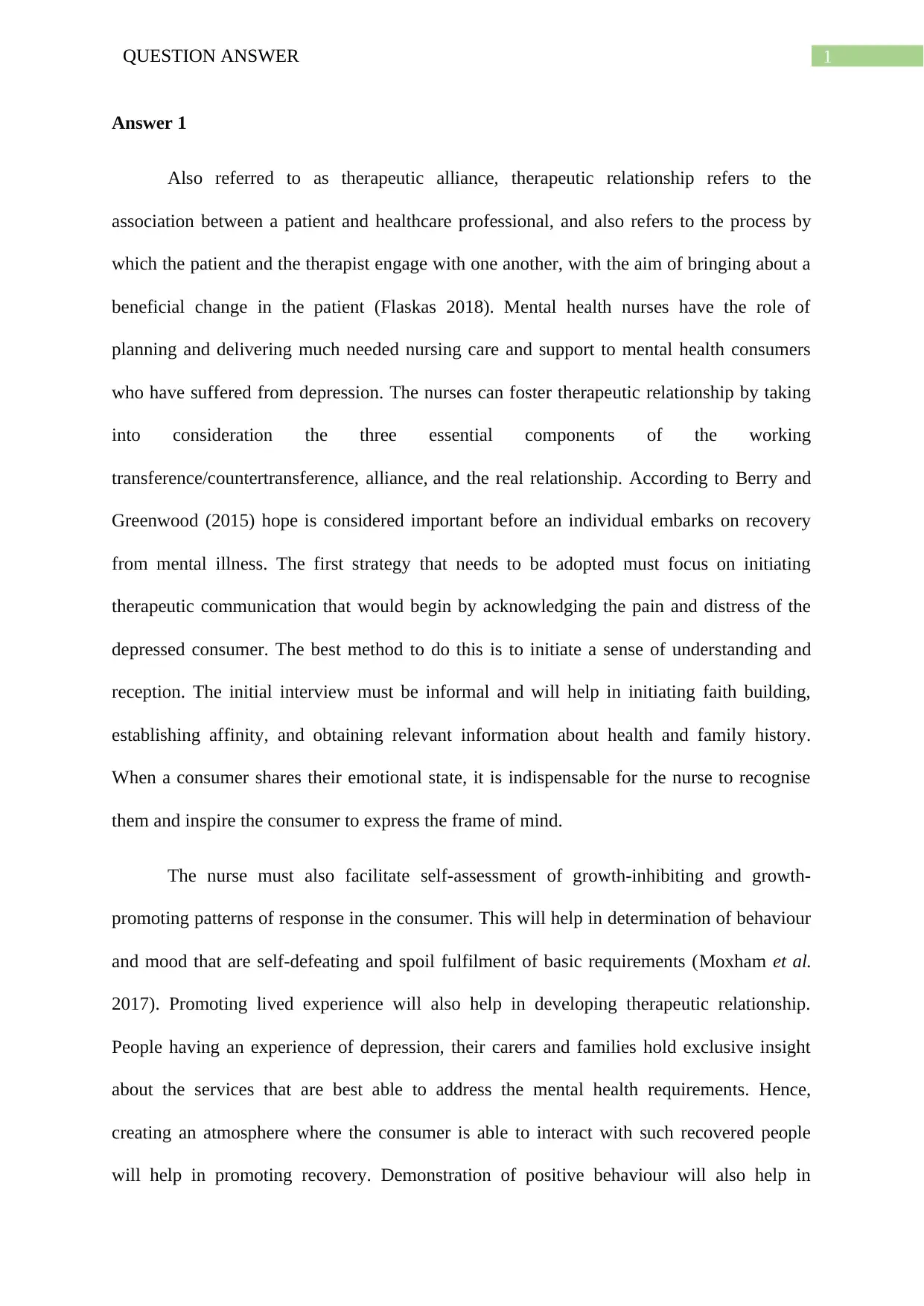
1QUESTION ANSWER
Answer 1
Also referred to as therapeutic alliance, therapeutic relationship refers to the
association between a patient and healthcare professional, and also refers to the process by
which the patient and the therapist engage with one another, with the aim of bringing about a
beneficial change in the patient (Flaskas 2018). Mental health nurses have the role of
planning and delivering much needed nursing care and support to mental health consumers
who have suffered from depression. The nurses can foster therapeutic relationship by taking
into consideration the three essential components of the working
transference/countertransference, alliance, and the real relationship. According to Berry and
Greenwood (2015) hope is considered important before an individual embarks on recovery
from mental illness. The first strategy that needs to be adopted must focus on initiating
therapeutic communication that would begin by acknowledging the pain and distress of the
depressed consumer. The best method to do this is to initiate a sense of understanding and
reception. The initial interview must be informal and will help in initiating faith building,
establishing affinity, and obtaining relevant information about health and family history.
When a consumer shares their emotional state, it is indispensable for the nurse to recognise
them and inspire the consumer to express the frame of mind.
The nurse must also facilitate self-assessment of growth-inhibiting and growth-
promoting patterns of response in the consumer. This will help in determination of behaviour
and mood that are self-defeating and spoil fulfilment of basic requirements (Moxham et al.
2017). Promoting lived experience will also help in developing therapeutic relationship.
People having an experience of depression, their carers and families hold exclusive insight
about the services that are best able to address the mental health requirements. Hence,
creating an atmosphere where the consumer is able to interact with such recovered people
will help in promoting recovery. Demonstration of positive behaviour will also help in
Answer 1
Also referred to as therapeutic alliance, therapeutic relationship refers to the
association between a patient and healthcare professional, and also refers to the process by
which the patient and the therapist engage with one another, with the aim of bringing about a
beneficial change in the patient (Flaskas 2018). Mental health nurses have the role of
planning and delivering much needed nursing care and support to mental health consumers
who have suffered from depression. The nurses can foster therapeutic relationship by taking
into consideration the three essential components of the working
transference/countertransference, alliance, and the real relationship. According to Berry and
Greenwood (2015) hope is considered important before an individual embarks on recovery
from mental illness. The first strategy that needs to be adopted must focus on initiating
therapeutic communication that would begin by acknowledging the pain and distress of the
depressed consumer. The best method to do this is to initiate a sense of understanding and
reception. The initial interview must be informal and will help in initiating faith building,
establishing affinity, and obtaining relevant information about health and family history.
When a consumer shares their emotional state, it is indispensable for the nurse to recognise
them and inspire the consumer to express the frame of mind.
The nurse must also facilitate self-assessment of growth-inhibiting and growth-
promoting patterns of response in the consumer. This will help in determination of behaviour
and mood that are self-defeating and spoil fulfilment of basic requirements (Moxham et al.
2017). Promoting lived experience will also help in developing therapeutic relationship.
People having an experience of depression, their carers and families hold exclusive insight
about the services that are best able to address the mental health requirements. Hence,
creating an atmosphere where the consumer is able to interact with such recovered people
will help in promoting recovery. Demonstration of positive behaviour will also help in
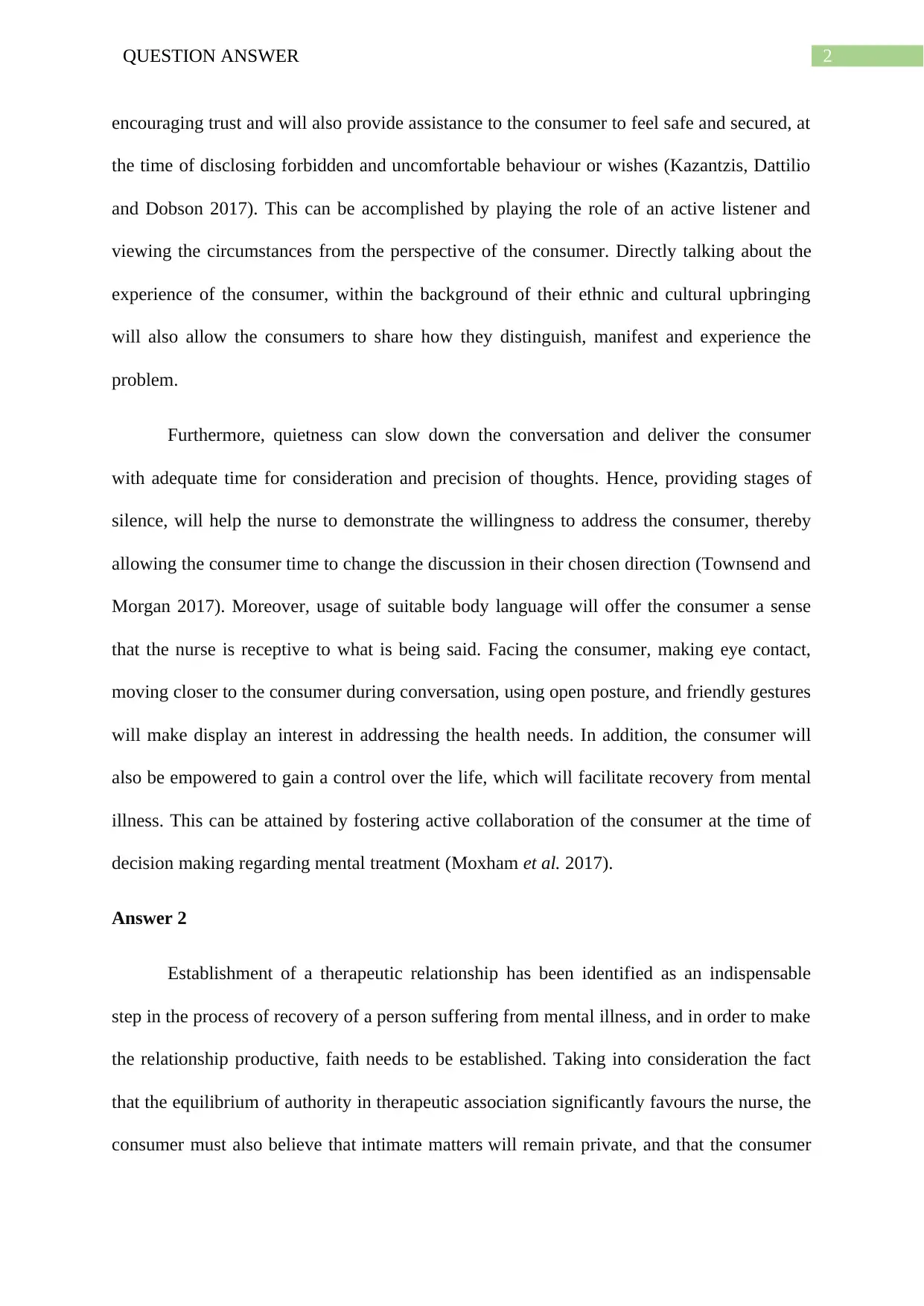
2QUESTION ANSWER
encouraging trust and will also provide assistance to the consumer to feel safe and secured, at
the time of disclosing forbidden and uncomfortable behaviour or wishes (Kazantzis, Dattilio
and Dobson 2017). This can be accomplished by playing the role of an active listener and
viewing the circumstances from the perspective of the consumer. Directly talking about the
experience of the consumer, within the background of their ethnic and cultural upbringing
will also allow the consumers to share how they distinguish, manifest and experience the
problem.
Furthermore, quietness can slow down the conversation and deliver the consumer
with adequate time for consideration and precision of thoughts. Hence, providing stages of
silence, will help the nurse to demonstrate the willingness to address the consumer, thereby
allowing the consumer time to change the discussion in their chosen direction (Townsend and
Morgan 2017). Moreover, usage of suitable body language will offer the consumer a sense
that the nurse is receptive to what is being said. Facing the consumer, making eye contact,
moving closer to the consumer during conversation, using open posture, and friendly gestures
will make display an interest in addressing the health needs. In addition, the consumer will
also be empowered to gain a control over the life, which will facilitate recovery from mental
illness. This can be attained by fostering active collaboration of the consumer at the time of
decision making regarding mental treatment (Moxham et al. 2017).
Answer 2
Establishment of a therapeutic relationship has been identified as an indispensable
step in the process of recovery of a person suffering from mental illness, and in order to make
the relationship productive, faith needs to be established. Taking into consideration the fact
that the equilibrium of authority in therapeutic association significantly favours the nurse, the
consumer must also believe that intimate matters will remain private, and that the consumer
encouraging trust and will also provide assistance to the consumer to feel safe and secured, at
the time of disclosing forbidden and uncomfortable behaviour or wishes (Kazantzis, Dattilio
and Dobson 2017). This can be accomplished by playing the role of an active listener and
viewing the circumstances from the perspective of the consumer. Directly talking about the
experience of the consumer, within the background of their ethnic and cultural upbringing
will also allow the consumers to share how they distinguish, manifest and experience the
problem.
Furthermore, quietness can slow down the conversation and deliver the consumer
with adequate time for consideration and precision of thoughts. Hence, providing stages of
silence, will help the nurse to demonstrate the willingness to address the consumer, thereby
allowing the consumer time to change the discussion in their chosen direction (Townsend and
Morgan 2017). Moreover, usage of suitable body language will offer the consumer a sense
that the nurse is receptive to what is being said. Facing the consumer, making eye contact,
moving closer to the consumer during conversation, using open posture, and friendly gestures
will make display an interest in addressing the health needs. In addition, the consumer will
also be empowered to gain a control over the life, which will facilitate recovery from mental
illness. This can be attained by fostering active collaboration of the consumer at the time of
decision making regarding mental treatment (Moxham et al. 2017).
Answer 2
Establishment of a therapeutic relationship has been identified as an indispensable
step in the process of recovery of a person suffering from mental illness, and in order to make
the relationship productive, faith needs to be established. Taking into consideration the fact
that the equilibrium of authority in therapeutic association significantly favours the nurse, the
consumer must also believe that intimate matters will remain private, and that the consumer
⊘ This is a preview!⊘
Do you want full access?
Subscribe today to unlock all pages.

Trusted by 1+ million students worldwide
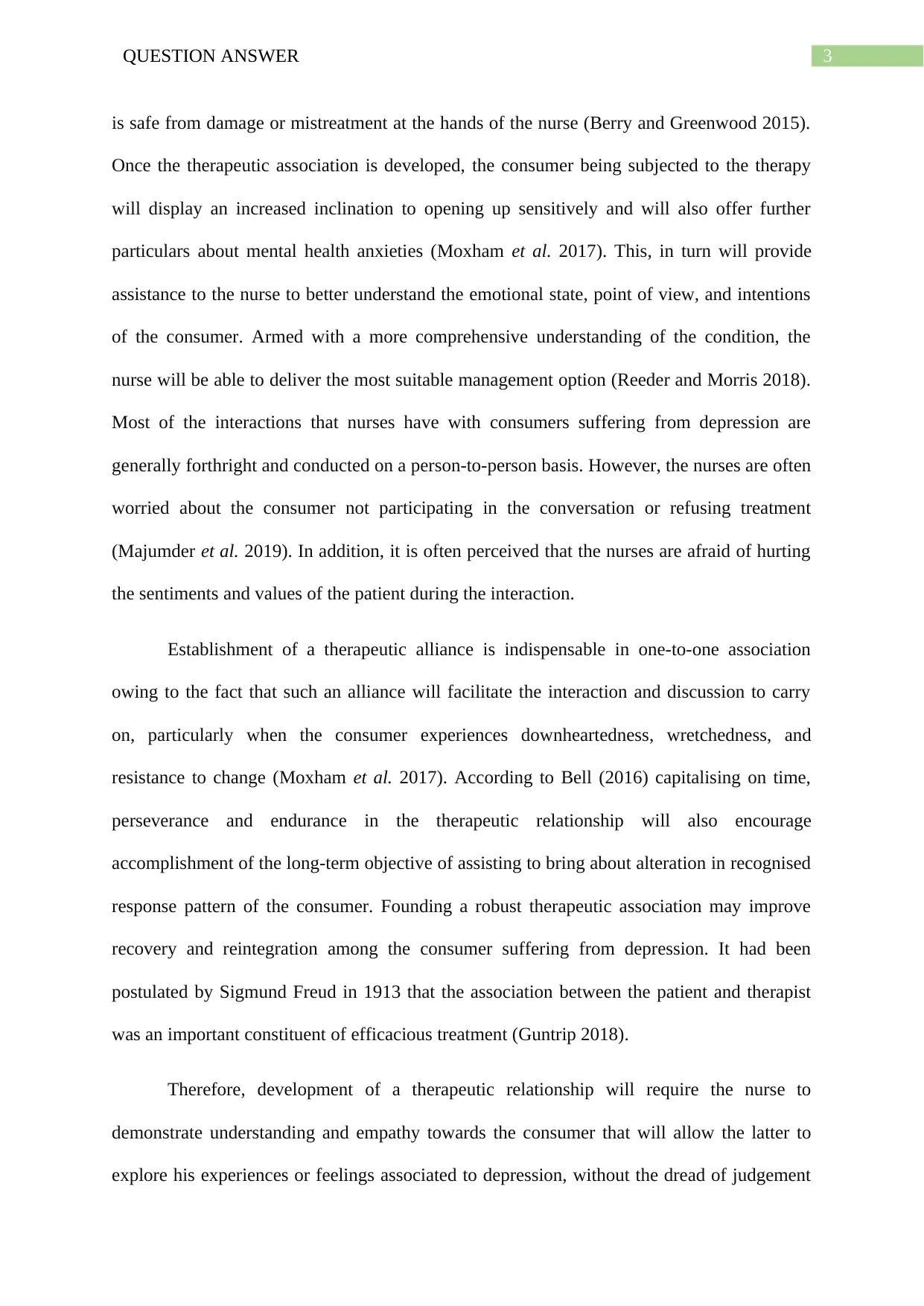
3QUESTION ANSWER
is safe from damage or mistreatment at the hands of the nurse (Berry and Greenwood 2015).
Once the therapeutic association is developed, the consumer being subjected to the therapy
will display an increased inclination to opening up sensitively and will also offer further
particulars about mental health anxieties (Moxham et al. 2017). This, in turn will provide
assistance to the nurse to better understand the emotional state, point of view, and intentions
of the consumer. Armed with a more comprehensive understanding of the condition, the
nurse will be able to deliver the most suitable management option (Reeder and Morris 2018).
Most of the interactions that nurses have with consumers suffering from depression are
generally forthright and conducted on a person-to-person basis. However, the nurses are often
worried about the consumer not participating in the conversation or refusing treatment
(Majumder et al. 2019). In addition, it is often perceived that the nurses are afraid of hurting
the sentiments and values of the patient during the interaction.
Establishment of a therapeutic alliance is indispensable in one-to-one association
owing to the fact that such an alliance will facilitate the interaction and discussion to carry
on, particularly when the consumer experiences downheartedness, wretchedness, and
resistance to change (Moxham et al. 2017). According to Bell (2016) capitalising on time,
perseverance and endurance in the therapeutic relationship will also encourage
accomplishment of the long-term objective of assisting to bring about alteration in recognised
response pattern of the consumer. Founding a robust therapeutic association may improve
recovery and reintegration among the consumer suffering from depression. It had been
postulated by Sigmund Freud in 1913 that the association between the patient and therapist
was an important constituent of efficacious treatment (Guntrip 2018).
Therefore, development of a therapeutic relationship will require the nurse to
demonstrate understanding and empathy towards the consumer that will allow the latter to
explore his experiences or feelings associated to depression, without the dread of judgement
is safe from damage or mistreatment at the hands of the nurse (Berry and Greenwood 2015).
Once the therapeutic association is developed, the consumer being subjected to the therapy
will display an increased inclination to opening up sensitively and will also offer further
particulars about mental health anxieties (Moxham et al. 2017). This, in turn will provide
assistance to the nurse to better understand the emotional state, point of view, and intentions
of the consumer. Armed with a more comprehensive understanding of the condition, the
nurse will be able to deliver the most suitable management option (Reeder and Morris 2018).
Most of the interactions that nurses have with consumers suffering from depression are
generally forthright and conducted on a person-to-person basis. However, the nurses are often
worried about the consumer not participating in the conversation or refusing treatment
(Majumder et al. 2019). In addition, it is often perceived that the nurses are afraid of hurting
the sentiments and values of the patient during the interaction.
Establishment of a therapeutic alliance is indispensable in one-to-one association
owing to the fact that such an alliance will facilitate the interaction and discussion to carry
on, particularly when the consumer experiences downheartedness, wretchedness, and
resistance to change (Moxham et al. 2017). According to Bell (2016) capitalising on time,
perseverance and endurance in the therapeutic relationship will also encourage
accomplishment of the long-term objective of assisting to bring about alteration in recognised
response pattern of the consumer. Founding a robust therapeutic association may improve
recovery and reintegration among the consumer suffering from depression. It had been
postulated by Sigmund Freud in 1913 that the association between the patient and therapist
was an important constituent of efficacious treatment (Guntrip 2018).
Therefore, development of a therapeutic relationship will require the nurse to
demonstrate understanding and empathy towards the consumer that will allow the latter to
explore his experiences or feelings associated to depression, without the dread of judgement
Paraphrase This Document
Need a fresh take? Get an instant paraphrase of this document with our AI Paraphraser
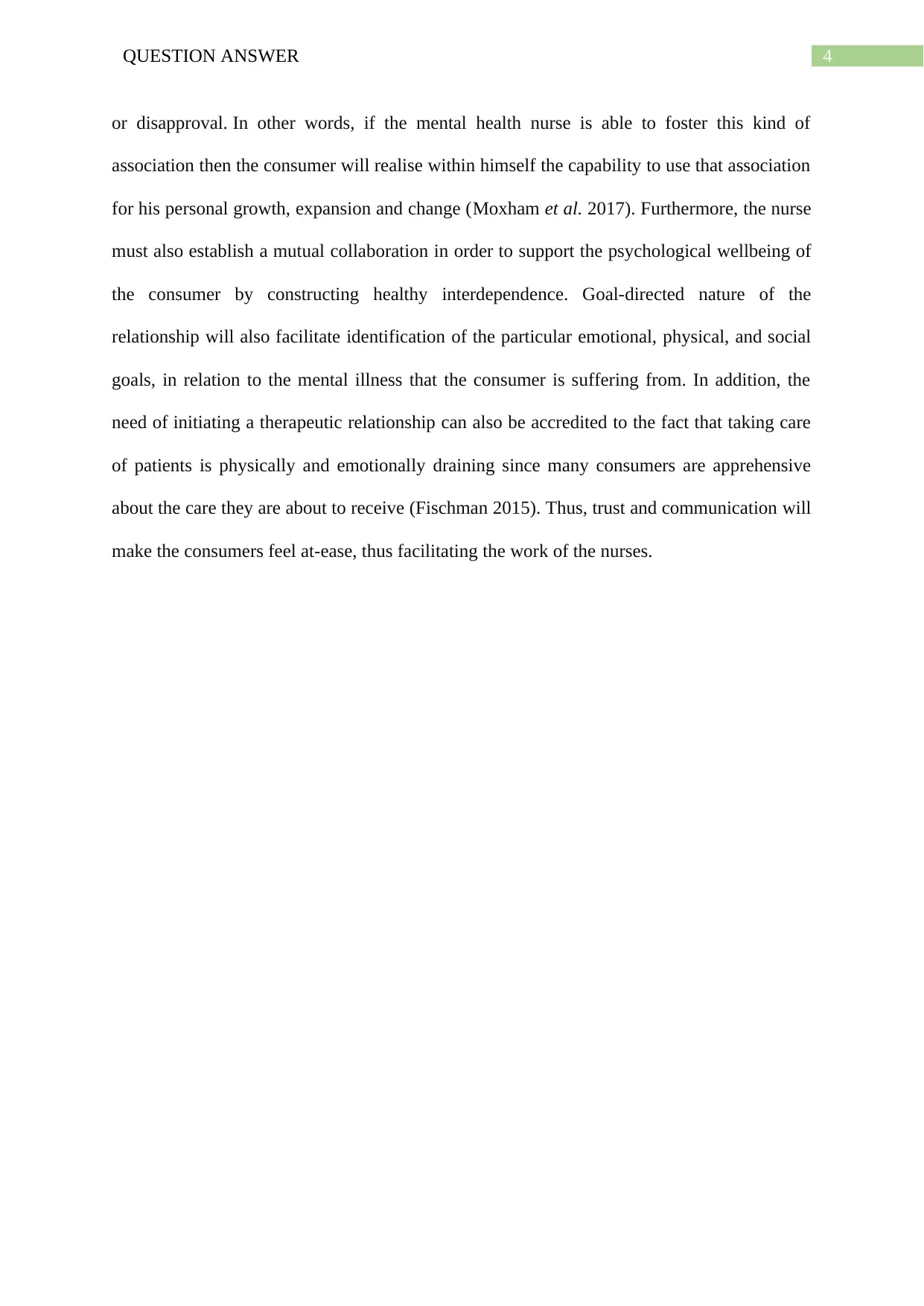
4QUESTION ANSWER
or disapproval. In other words, if the mental health nurse is able to foster this kind of
association then the consumer will realise within himself the capability to use that association
for his personal growth, expansion and change (Moxham et al. 2017). Furthermore, the nurse
must also establish a mutual collaboration in order to support the psychological wellbeing of
the consumer by constructing healthy interdependence. Goal-directed nature of the
relationship will also facilitate identification of the particular emotional, physical, and social
goals, in relation to the mental illness that the consumer is suffering from. In addition, the
need of initiating a therapeutic relationship can also be accredited to the fact that taking care
of patients is physically and emotionally draining since many consumers are apprehensive
about the care they are about to receive (Fischman 2015). Thus, trust and communication will
make the consumers feel at-ease, thus facilitating the work of the nurses.
or disapproval. In other words, if the mental health nurse is able to foster this kind of
association then the consumer will realise within himself the capability to use that association
for his personal growth, expansion and change (Moxham et al. 2017). Furthermore, the nurse
must also establish a mutual collaboration in order to support the psychological wellbeing of
the consumer by constructing healthy interdependence. Goal-directed nature of the
relationship will also facilitate identification of the particular emotional, physical, and social
goals, in relation to the mental illness that the consumer is suffering from. In addition, the
need of initiating a therapeutic relationship can also be accredited to the fact that taking care
of patients is physically and emotionally draining since many consumers are apprehensive
about the care they are about to receive (Fischman 2015). Thus, trust and communication will
make the consumers feel at-ease, thus facilitating the work of the nurses.
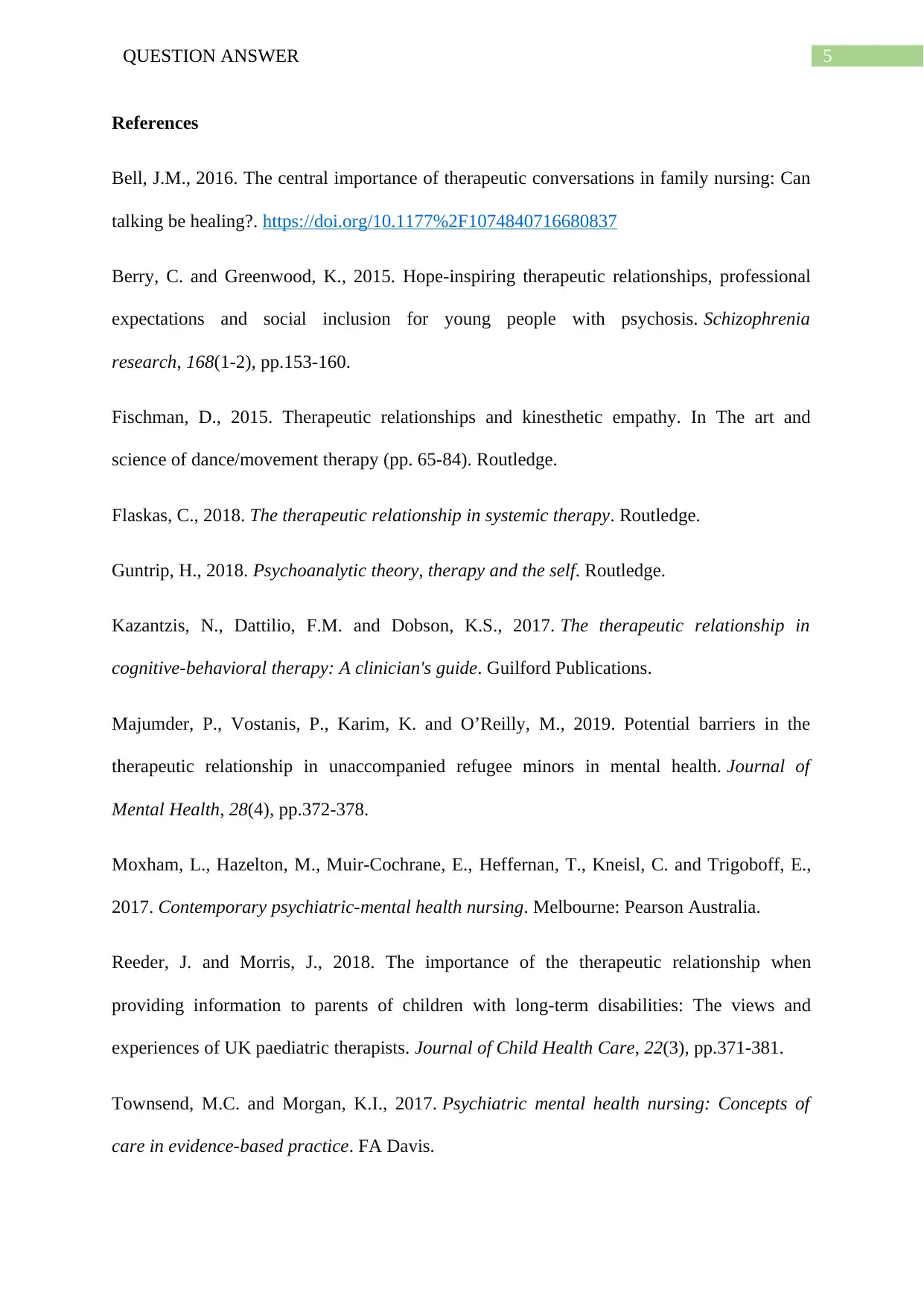
5QUESTION ANSWER
References
Bell, J.M., 2016. The central importance of therapeutic conversations in family nursing: Can
talking be healing?. https://doi.org/10.1177%2F1074840716680837
Berry, C. and Greenwood, K., 2015. Hope-inspiring therapeutic relationships, professional
expectations and social inclusion for young people with psychosis. Schizophrenia
research, 168(1-2), pp.153-160.
Fischman, D., 2015. Therapeutic relationships and kinesthetic empathy. In The art and
science of dance/movement therapy (pp. 65-84). Routledge.
Flaskas, C., 2018. The therapeutic relationship in systemic therapy. Routledge.
Guntrip, H., 2018. Psychoanalytic theory, therapy and the self. Routledge.
Kazantzis, N., Dattilio, F.M. and Dobson, K.S., 2017. The therapeutic relationship in
cognitive-behavioral therapy: A clinician's guide. Guilford Publications.
Majumder, P., Vostanis, P., Karim, K. and O’Reilly, M., 2019. Potential barriers in the
therapeutic relationship in unaccompanied refugee minors in mental health. Journal of
Mental Health, 28(4), pp.372-378.
Moxham, L., Hazelton, M., Muir-Cochrane, E., Heffernan, T., Kneisl, C. and Trigoboff, E.,
2017. Contemporary psychiatric-mental health nursing. Melbourne: Pearson Australia.
Reeder, J. and Morris, J., 2018. The importance of the therapeutic relationship when
providing information to parents of children with long-term disabilities: The views and
experiences of UK paediatric therapists. Journal of Child Health Care, 22(3), pp.371-381.
Townsend, M.C. and Morgan, K.I., 2017. Psychiatric mental health nursing: Concepts of
care in evidence-based practice. FA Davis.
References
Bell, J.M., 2016. The central importance of therapeutic conversations in family nursing: Can
talking be healing?. https://doi.org/10.1177%2F1074840716680837
Berry, C. and Greenwood, K., 2015. Hope-inspiring therapeutic relationships, professional
expectations and social inclusion for young people with psychosis. Schizophrenia
research, 168(1-2), pp.153-160.
Fischman, D., 2015. Therapeutic relationships and kinesthetic empathy. In The art and
science of dance/movement therapy (pp. 65-84). Routledge.
Flaskas, C., 2018. The therapeutic relationship in systemic therapy. Routledge.
Guntrip, H., 2018. Psychoanalytic theory, therapy and the self. Routledge.
Kazantzis, N., Dattilio, F.M. and Dobson, K.S., 2017. The therapeutic relationship in
cognitive-behavioral therapy: A clinician's guide. Guilford Publications.
Majumder, P., Vostanis, P., Karim, K. and O’Reilly, M., 2019. Potential barriers in the
therapeutic relationship in unaccompanied refugee minors in mental health. Journal of
Mental Health, 28(4), pp.372-378.
Moxham, L., Hazelton, M., Muir-Cochrane, E., Heffernan, T., Kneisl, C. and Trigoboff, E.,
2017. Contemporary psychiatric-mental health nursing. Melbourne: Pearson Australia.
Reeder, J. and Morris, J., 2018. The importance of the therapeutic relationship when
providing information to parents of children with long-term disabilities: The views and
experiences of UK paediatric therapists. Journal of Child Health Care, 22(3), pp.371-381.
Townsend, M.C. and Morgan, K.I., 2017. Psychiatric mental health nursing: Concepts of
care in evidence-based practice. FA Davis.
⊘ This is a preview!⊘
Do you want full access?
Subscribe today to unlock all pages.

Trusted by 1+ million students worldwide
1 out of 6
Related Documents
Your All-in-One AI-Powered Toolkit for Academic Success.
+13062052269
info@desklib.com
Available 24*7 on WhatsApp / Email
![[object Object]](/_next/static/media/star-bottom.7253800d.svg)
Unlock your academic potential
Copyright © 2020–2026 A2Z Services. All Rights Reserved. Developed and managed by ZUCOL.



